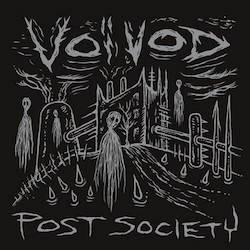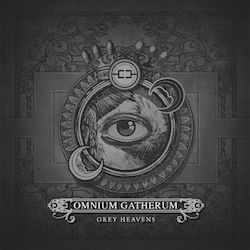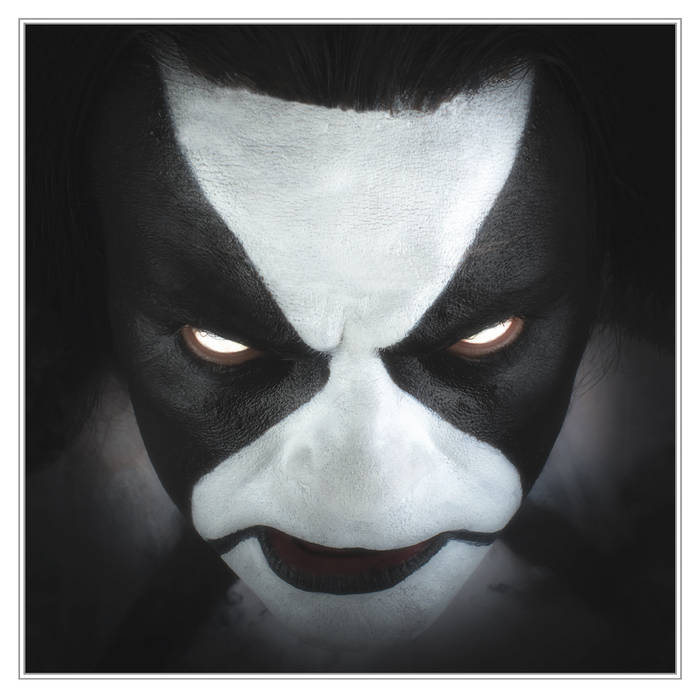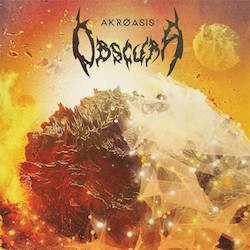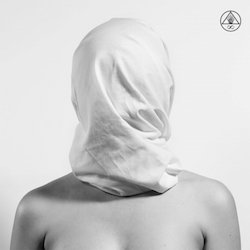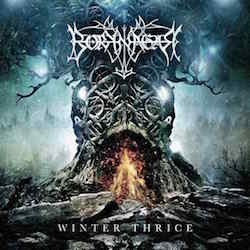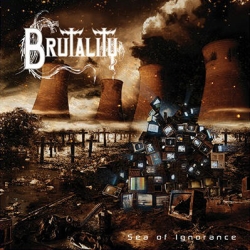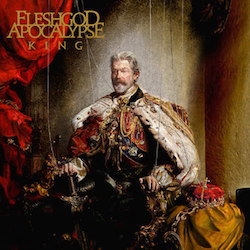

ORIGINAL VERSION:
HORRORSCAPE:
After three years without studio recordings, we would like to ask you for anticipations about your next
full-length.
CHRIS:
The next regular album will probably be a loooong way into the future. We’re still working on our rock opera and
we expect to have the compositional work ended this year and be able to record and launch the opera next year. Then we hopefully will perform it for a very long time. Whenever we are done
with that we will start working on material for another regular album. I’d say we’re talking an absolute minimum 3 years from now.
HORRORSCAPE:
What period of Therion do you like the most? What album is the most satisfying and exciting, for you?
CHRIS:
I think every period had it’s thrills and moments. But I never felt better than right now, we never had a better atmosphere in the band and the work with the rock opera is really a very special thrill.
Each album has it’s ups and downs and some of them stand out because of different things. Theli because it was a groundbreaking introduction of a new sound back at that time and because it was making the band a famous band after many years of struggle as an underground band. Vovin is also very special, as it was actually my solo album, there was no band at the time, just me + hired musicians. It was also the album that sold best and established the band once and for all. Secret of the Runes was very special as it was bringing the Swedish language out to a broad mass, I don’t think any other famous metal band did that before we did. Seeing fans trying to sing along with the Swedish lyrics when you play in countries on the other side of the planet is a very special feeling still today. Lemuria and Sirius B recordings was fulfilling my long time dream of working with a gigantic orchestra and choir (171 people were involved in the making of those albums). So there’s something special to me about so many records, it’s hard to pick one specific favourite.
HORRORSCAPE:
After the first albums, Therion changed their sound into a more Gothic mood, adding lyrical singing instead of that Death Metal roots characterized by you as singer: what was the cause to this changing? Maybe your passion for classical music?
CHRIS:
It was just a natural change. I tried to vary my voice on Symphony Masses and Lepaca Kliffoth and felt it was getting very limiting both with my voice and the whole idea of being stuck with one singer as a concept in it self. On Lepaca Kliffoth I therefore started to experiment with using some other singers (two opera singers and one rock singer) and realised this is the way to go for me. So on Theli this continued with a wider range of singers with me just singing some parts. For the coming 3 albums after that I never took any outspoken decision of not singing, I just didn’t write any songs that needed my type of vocals. But on the Lemuria album, there were two songs that needed raw vocals, so then I sang again. So there were never any rejection of death metal, it just fell out by it self due to the spontaneous song writing. I guess Celtic Frost was also very much responsible for the development. They were my big fave band back then and their transition from death metal pioneers to avante garde metal pioneers had a deep impact on my way of thinking musically. A band most often experiment with their style in the beginning of their career, but when they get famous with something, they mostly stick to that style, let it define them and don’t risk their success. Celtic Frost risked everything for the sake of fulfilling their musical vision seeking and I inherited that passion from them.
HORRORSCAPE:
Albums such as “Lemuria-Sirius B” and “Gothic Kabalah”, in our opinion the best you gave birth to (even if all the others are masterpieces as well), describe all Therion’s greatness with two consecutive full-leghts, which, actually, gets its distances by the former works: what are the reasons of this choice?
CHRIS:
I’m not sure I understand this question in regard to Lemuria and Sirius B. In my opinion they musically follow the path of the previous 4 albums. With Gothic Kabbalah it’s different, this album offered a drastic change of sound by hardly having any opera voices at all and having choirs using opera singers with rock singers. It was also very progressive in it’s music style and compositions, a lot of odd time signatures and tricky guitar chords. There’s normally not a specific reason why Therion do this or that, I just write some songs and see where the wind is blowing and make a record I like.
HORRORSCAPE:
The Trilogy made of “Lemuria”, “Sirius B” and “Sithra Ahra” is interrupted by “Gothic Kaballah”: why did you published that album within the Trilogy?
CHRIS:
Because I wrote some songs that took a different direction. Then we used two songs that was originally intended for Sitra Ahra (Mitternacht Löwe and Adulruna Rediviva) and put for Gothic Kabbalah instead, so it got connected and therefore became a quadralogy instead.
HORRORSCAPE:
After “Sitra Ahra”, Therion decides to release an whole album of covered French songs. What are the reasons of this sophisticated and unpredictable decision, to celebrate your 25th anniversary?
CHRIS:
I always wanted to make a cover album from songs that people didn’t know, songs that I thought I could turn into great Therion songs. When I made a list of songs I wanted to do, I realised that half of the list was old french songs, so then I came up with the idea of making a totally french album. I also got so bored by suggestions from the record label to do a ”best of” CD that I felt I really need to do something more drastic to keep the Therion spirit alive and awake. Therion never intentionally tried to push boundaries or provoke musically, things just happened the way they did. But when summing things up celebrating the 25 year anniversary, I wanted to express that intentionally when celebrating the achievements of the band
HORRORSCAPE:
By the way, about “Les Fleurs du Mal”: it caused to the fans a huge surprise. Have you ever been afraid the album could have been misunderstood and criticized?
CHRIS:
Well, much of the confusion is because I did my work a bit too well - tons of people STILL don’t understand (or forget) that it’s a cover album. You see comments like ”I don’t like this new style” referring to the album. New style?? It’s a COVER album. I mean, if we would have made a cover album consisting of songs from Motorhead, Iron Maiden, Judas Priest and other known metal bands and re-made them into sounding therionish, no one would have mistaken it. But now many don’t even understand these are cover songs and think I wrote the music. And this was a part of the concept; to show that how you ”dress” music is just as important as the core of the composition. I wanted to take songs that basically all our fans would reject in their original form and then just re-arrange them as little as possible to fit in to the Therion sound. At the same time I wanted to provoke with it and show how you can promote something on using also negative publicity.
HORRORSCAPE:
We would like to ask a little curiosity: browsing your store, we got you produce a lemon-flavoured liquor, the so-named “Limoncello”, beloved in South Italy, and you also brew your own brand beer: how began this passion?
CHRIS:
I have been to Capri several years and got very attached to limoncello there. In Sweden there’s only one brand available via import and I got fed up with it and decided to try to create my own instead.
I don’t brew beer, I’m making mead, that’s something completely different. It’s basically a honey wine. I thought the ones in the store were not good enough, so I started to brew my own.
HORRORSCAPE:
During your long career we beheld many line-up changes: some of them left the band for their own reasons, other had to be replaced… but we would like to know particularly about the detachment with Katarina Lilja and her amazing voice.
CHRIS:
There were not as many line-up changes as many people think. People mix up permanent members with hired session singers. It’s a part of Therion’s concept to have a variety of voices. Kat was for example a hired singer and never a member of the band. We were really happy with her performance, but she decided she didn’t want to tor around the world anymore. This lifestyle is not for everyone. Some can’t handle it at all, some love it and never want to stop and some are in between; they love exploring it for some years, but after that they feel like ”been there, done that” and feel saturated. That might be very hard to imagine for someone who dream about becoming a touring artist or for someone who is successful and just love that type of life with touring and traveling a lot, but that’s how it is.
HORRORSCAPE:
Metal music has been with you, as well as with us, for over twenty years: what is there really different from 80’s bands and nowadays ones, of any Metal subgenre? What is today missing, realted to what in the 80’s excited us all?
CHRIS:
A big difference today is that songs are more often created by one person sitting in front of a computer arranging rather than playing a band together in a rehearsal room trying to arrange riffs that someone came up with. It both opens up many more possibilities, but can also make music more square and predictable. Another thing is that when you make an album today it’s often filled with many less god songs. Back in the vinyl days the albums were shorter and you’d pick 10 killers songs. 40 min back in the vinyl days was an album. Maybe there would be one or two songs not very good. Today people whine if the record is not 60 min and that often means there are several songs on a the record that should better have have been single B-sides (if there were still singles being made). So you seldom hear a straight forward metal album that totally knock you out these days, as it’s full of filler tracks. You can also see this with old bands making new records. And even worse is when they stuff it with a lot of bonus songs for special editions. Like when I bought the latest Judas Priest album - 18 fucking songs! The album was already a bit flat and weary with 13 songs, who needs 5 more less good songs added onto that just because it’s free? I’d rather had them write songs for a few months more and release an album with 10 songs that runs me over totally. That’s what I miss with the 80’s. Things were shorter and more explosive and ran over you like a bulldozer.
HORRORSCAPE:
We got to an end: and we would like to ask you what you think about Horroscape itself.
CHRIS:
You guys seems to be very dedicated to music in general and big fans of Therion. Emoticon smile.
________________________________________________________________
HORRORSCAPE:
Dopo tre anni senza registrazioni in studio, ci piacerebbe avere delle anticipazioni riguardo il vostro prossimo full-lenght.
CHRIS:
Il prossimo album vero e proprio arriverà probabilmente in un futuro mooolto lontano. Stiamo ancora lavorando alla nostra Opera-Rock, e ci aspettiamo di riuscire a finire la composizione quest’anno per poi registrarla e rilasciarla l’anno prossimo. Poi, speriamo di suonarla in giro per un po’. Quando avremo finito cominceremo a lavorare al prossimo album, ma direi che ci vorranno non meno di tre anni da adesso.
HORRORSCAPE:
Qual è il periodo della carriera dei Therion a cui sei maggiormente affezionato? Qual è, per te, l'album più soddisfacente ed emozionante?
CHRIS:
Credo che ogni periodo abbia avuto i suoi brividi e i suoi bei momenti. Ma non mi son mai sentito bene come ora, non abbiamo mai avuto un’atmosfera migliore all’interno della band e il lavoro sull’Opera Rock è davvero un qualcosa di speciale. Ogni album ha avuto i suoi alti e bassi, e ognuno si distingue per una diversa caratteristica… “Theli” per la sua terremotante introduzione di un sound nuovo, per l’epoca, e perché è stato l’album che ha trasformato i Therion in una band famosa dopo anni di gavetta nell’underground. “Vovin” è anche molto speciale, e a dire il vero era un mio album solista, non c’era una band, all’epoca, solo io e dei turnisti. È stato anche l’album con le vendite migliori, e quello che ha stabilizzato la band una volta per tutte. “Secrets of the Runes” è speciale perché ha portato lo svedese alle folle estere, e non riesco a pensare a nessun’altra band metal di un certo rilievo che l’abbia mai fatto prima. Vedere i fan che cercano di cantare i testi in svedese anche quando suoni dall’altra parte del mondo è una bella sensazione ancora oggi. “Lemuria” e “Sirius B” hanno avverato il mio sogno nel cassetto di lavorare con un’enorme orchestra e coro (ben 171 persone hanno collaborato per questi album)… C’è qualcosa di speciale in ogni album, per me è difficile scegliere un preferito.
HORRORSCAPE:
Dopo i primi album, i Therion hanno cambiato il loro sound, spingendolo maggiormente verso il Gothic, abbandonando le radici Death Metal caratterizzate da te nel ruolo di cantante: quali sono state le cause di questo cambiamento? Forse la tua passione per la musica classica?
CHRIS:
È stato un cambiamento semplicemente naturale. Ho provato a variare la mia voce su “Symphony Masses” e “Lepaca Kliffoth”, ma mi sembrava di essere limitato sia dalla mia voce, sia dall’idea stessa di avere “un” cantante e basta. Su “Lepaca Kliffoth” ho iniziato a sperimentare, usando altre voci (due cantanti lirici e un cantante rock), e mi son reso conto che era la strada giusta da seguire. Quindi, su “Theli” ho continuato, aumentando il numero di altri cantanti, lasciando la mia voce solo per alcune parti. Per i successivi tre album non ho mai preso una decisione di non cantare: semplicemente, non ho mai scritto parti che richiedessero la mia voce. Su “Lemuria”, invece, c’erano due canzoni che richiedevano una voce più cattiva, e quindi ho cantato di nuovo. Non c’è stato alcun “rifiuto” del Death Metal, è semplicemente e spontaneamente uscito di scena rispetto allo stile delle canzoni che scrivevo. Credo che i Celtic Frost siano stati molto influenti per questa evoluzione. Anni fa erano decisamente il mio gruppo preferito, e il loro passaggio dal pionieristico Death Metal all’altrettanto sperimentale Avantgarde Metal ha avuto un grande impatto, sul mio modo di concepire e pensare la musica. Normalmente, una band sperimenta il proprio stile all’inizio della carriera, ma una volta raggiunto il successo si attacca a quello stile, lo definisce e non lo cambia, per non rischiare di perdere il successo guadagnato. I Celtic Frost hanno invece rischiato tutto pur di avverare la loro interpretazione della musica, e credo di aver ereditato da loro questa grande passione.
HORRORSCAPE:
Album come “Lemuria-Sirius B” e “Gothic Kaballah”, a nostro avviso i migliori a cui hai dato la luce (seppure anche gli altri siano capolavori, intendiamoci), descrivono tutta la bravura dei Therion in due consecutivi doppi album che prendono molto le distanze dai precedenti lavori: quali sono le cause di questa scelta?
CHRIS:
Non sono sicuro di aver capito la domanda, riguardo “Lemuria” e “Sirius B”: secondo me, questi album musicalmente seguono la via dei precedenti quattro. Con Gothic Kabalah è diverso, offre un drastico cambiamento del sound, con pochissime voci liriche e con cori misti di cantanti rock e lirici. È davvero un qualcosa di molto “progressive” nello stile e nella composizione, con un sacco di tempi dispari e ingannevoli accordi di chitarra. Normalmente non c’è una ragione specifica per cui i Therion fanno questo piuttosto che quello: semplicemente scrivo dei pezzi e vedo dove il vento mi porta per fare, alla fine dei conti, un album che mi piaccia.
HORRORSCAPE:
La Trilogia composta da “Lemuria”, “Sirius B” e “Sithra Ahra” è interrotta da “Gothic Kabalah”: perché avete pubblicato questo album in mezzo al fluire della Trilogia stessa?
CHRIS:
Semplicemente perché avevo scritto canzoni che andavano in una direzione diversa. Abbiamo anche preso due canzoni originariamente destinate a “Sithra Ahra” (Mitternacht Löwe e Adulruna Rediviva) e le abbiamo messe in “Gothic Kabalah”, in modo da collegarlo agli altri e trasformare il tutto in una Quadrilogia.
HORRORSCAPE:
Dopo “Sitra Ahra”, i Therion hanno deciso di rilasciare un intero album di cover di canzoni francesi. Quali sono le ragioni dietro questa sofisticata e inaspettata decisione, per celebrare il vostro venticinquesimo anniversario?
CHRIS:
Ho sempre voluto fare un album di cover che la gente non conosce, canzoni che pensavo di poter rendere dei fantastici pezzi marchiati “Therion”. Quando ho fatto la lista delle canzoni che volevo fare, mi sono accorto che una buona metà era francese, quindi ho deciso di fare un album totalmente francese. In più, ho trovato il suggerimento della casa discografica di fare un “Best of” così noioso e banale che sentivo di dover fare qualcosa di più drastico per tenere lo spirito dei Therion vivo e sveglio. Non abbiamo mai voluto porci dei limiti, le cose semplicemente fluiscono naturalmente. Ma quando abbiamo tirato le somme in vista del venticinquesimo anniversario, ho voluto cogliere l’occasione per esprimere esplicitamente questa nostra caratteristica.
HORRORSCAPE:
A proposito di “Les Fleurs du Mal“: ha causato nei fan un’enorme sorpresa. Hai mai temuto che quell’album potesse essere frainteso, non compreso adeguatamente e, per questo, criticato?
CHRIS:
Be’, causa di gran parte della confusione è che ho fatto il mio lavoro troppo bene – molte persone ancora oggi non sanno (o dimenticano) che si tratta di un album di cover. Ho visto commenti tipo “Non mi piace il vostro nuovo stile), riferiti, appunto, al nuovo album. Nuovo stile?! È un album di COVER! Voglio dire, se avessimo fatto un album di cover di Motorhead, Iron Maiden, Judas Priest e altri gruppi metal famosi per farle suonare più “Therion”, nessuno le avrebbe scambiate per nostre. Ma molti non capiscono nemmeno che si tratta di cover e pensano che io abbia scritto le canzoni stesse… e questo, in effetti, era parte del concetto: mostrare che la forma con cui viene presentata una canzone è importante tanto quanto il cuore della composizione stessa. Fondamentalmente, volevo prendere canzoni che i nostri fan avrebbero aborrito, nella loro forma originale, e semplicemente ri-arrangiarle per farle suonare in pieno stile Therion. In più volevo lanciare una provocazione per mostrare che puoi promuovere qualcosa anche usando pubblicità negativa.
HORRORSCAPE:
Ci piacerebbe toglierci una piccola curiosità: esplorando il vostro store, abbiamo scoperto che produci un liquore al limone (il limoncello), che qui al Sud Italia è amatissimo (ma anche al Nord, NdT), e anche una vostra birra. Come è nata questa passione?
CHRIS:
Sono stato a Capri molti anni, e lì mi sono molto affezionato al Limoncello. In Svezia ce n’è una sola marca, d’importazione, ma me ne sono stufato, e ho quindi deciso di creare il “mio” Limoncello. Quanto alla birra, non faccio birra, ma idromele, che è una cosa completamente diversa… possiamo definirlo un “vino di miele”. Ero convinto che quelli già presenti nello store non fosse abbastanza buoni, quindi ho cominciato a fare il mio personale idromele.
HORRORSCAPE:
Durante la vostra lunga carriera, abbiamo assistito a molti cambi di formazione: alcuni hanno lasciato il gruppo per ragioni proprie, altri invece sono dovuti essere sostituiti… ma ci piacerebbe sapere, in particolare, della separazione con Katarina Lija e la sua splendida voce.
CHRIS:
I cambi di formazione non sono stati tanti quanto crede la gente, che confonde i membri veri e propri con cantanti assunti “a progetto”. Fa parte del concetto dei Therion di avere una grande varietà di voci. Kat, per esempio, era una session-member, non un membro del gruppo a pieno titolo. Siamo stati veramente soddisfatti della sua performance, ma lei non voleva più girare il mondo in tour, quello stile di vita non fa per tutti. Alcuni semplicemente non riescono a reggerlo, alcuni lo adorano e non si fermerebbero mai, e altri stanno nel mezzo; all’ inizio, i primi anni, piace, esplorano, ma poi si sentono di aver già vissuto quelle esperienze e se ne sentono sazi. Può essere difficile da concepire per qualcuno che sogna di diventare un musicista “da tour”, o anche per chi ha successo e semplicemente ama questa vita, ma è così.
HORRORSCAPE:
La musica Metal ti e ci ha accompagnato per oltre vent’anni: cosa è davvero cambiato dai gruppi degli anni ’80 e quelli di adesso, di qualunque sottogenere? Che cosa manca, oggi, rispetto a quello che negli anni ’80 ci ha tanto esaltato?
CHRIS:
Una grossa differenza è che oggi le canzoni sono spesso composte da un'unica persona che si siede davanti a un computer, arrangiando il tutto piuttosto che suonando come gruppo in sala prove, provando a raffinare i riff venuti in mente a qualcuno. Certo, offre maggiori possibilità, ma rende anche la musica più quadrata e prevedibile. Un’altra cosa è che quando scrivi un album, oggi, è sempre più “riempito”, e sempre meno da buone canzoni. Una volta, ai tempi del vinile, gli album erano più corti, e dovevi scegliere dieci canzoni omicide: un album era da 40 minuti. Magari c’era una canzone o due che non era ottima. Oggi la gente si lamenta se l’album non è di almeno un’ora, e spesso questo vuol dire aggiungere un certo numero di canzoni che sarebbero state meglio come singoli sul lato-B (se ancora si facessero i singoli). Quindi raramente ascolti un album Metal di quelli che ti arrivano dritti in faccia, perché son pieni di canzoni riempitive. Si può notare la stessa cosa anche nei nuovi album dei gruppi vecchi. E ancora peggio quando li gonfiano con un sacco di tracce bonus per le edizioni speciali. Come quando ho comprato l’ultimo album dei Judas Priest: 18 fottute canzoni! Già di suo, l’album era abbastanza piatto e “vecchio” con tredici, chi aveva bisogno delle altre cinque, ancor meno buone, aggiunte solo perché è gratis? Avrei preferito che avessero continuato a scrivere per qualche mese in più per poi uscire con un album da dieci tracce che mi avesse totalmente conquistato. È questo che mi manca degli anni ’80. Le cose erano più corte e ti calpestavano come un bulldozer.
HORRORSCAPE:
Siamo arrivati alla fine, e vorremmo chiederti cosa pensi del nostro progetto, Horrorscape.
CHRIS:
Voi ragazzi sembrate davvero devoti alla musica, e grandi fan dei Therion J


 "HORRORSCAPE"
"HORRORSCAPE"




